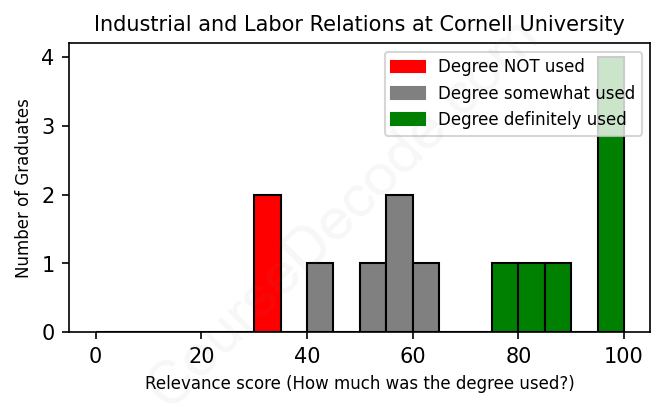
First, some facts. Of the Industrial and Labor Relations graduates from Cornell University we've analyzed , here's how many have used (or NOT used) their degree in their career:

These are estimates based on AI analysis of 14 LinkedIn profiles (see below).
The verdict? Slightly above average. Overall, with an average relevance score of 69%, Industrial and Labor Relations graduates from Cornell University have a slightly higher likelihood (+2%) of finding work in this field compared to the average graduate across all fields:
And for comparison, here's the chart for all profiles we've looked at across all degrees.
Also, after graduating, 57% of these graduates have pursued further education other than another Bachelor's degree (such as a Masters degree or other), compared to the average across all profiles of 35%. This suggests you may need more than just a Bachelors degree to be competitive as a Industrial and Labor Relations graduate.
See the details:
|
Relevance score: 100% We think this person has gone into a career highly relevant to their degree. We think this person has gone into a career highly relevant to their degree.
DEGREE INFOGraduated in 2023 from Cornell University with a Bachelor of Science - BS in Industrial and Labor Relations. No other secondary education since. JOB HISTORY SINCE GRADUATIONGlobal Human Resources Summer Analyst Bank of America Jun 2023 - Aug 2023 Globak Human Resources PMO Data Analyst  Bank of America Jan 2024 - Present ABOUTI have recently graduated from Cornell University with a Bachelors of Science in Industrial and Labor Relations with minors in Business and Information Science. Since first discovering HR in sophomore year of high school, I have been committed to pursuing a career exploring the intersectionality between people and data analytics, where I developed strong modeling and programming proficiencies. I hope to apply my strategic and technical background in related roles to help create meaningful, data-driven business decisions. |
The top 10 most common jobs done by the graduates we've analyzed (ranked most common to least) are:
From analyzing the LinkedIn profiles of graduates who earned a degree in Industrial and Labor Relations from Cornell University, it’s clear that career paths can vary widely. A significant portion of these graduates has taken roles in legal fields, particularly in law firms or judicial settings. Positions such as law clerks, associates, and legal interns are relatively common, which often involve aspects of labor relations and employment law. However, it’s important to note that many of these roles don't directly utilize knowledge from their Industrial and Labor Relations degrees; instead, they mostly require a broader understanding of legal processes.
On the flip side, there are also graduates who have found their footing in human resources and labor relations positions, which are much more relevant to their studies. Roles like HR Business Partners or Labor Relations Trial Examiners heavily draw on the skill set provided by their degree, indicating a strong alignment with the field of Industrial and Labor Relations. Overall, while some of the jobs may not directly link back to their studies, there’s a fair share of them that do relate, particularly in HR and labor-focused positions. So, if someone is considering this degree, they can expect a mix of opportunities, with a solid chance to dive into roles that truly reflect their academic background.
Here is a visual representation of the most common words in job titles for Industrial and Labor Relations graduates (this is across all Industrial and Labor Relations graduates we've analyzed, not just those who went to Cornell University):

Graduates from Cornell University's Industrial and Labor Relations program tend to have diverse career paths, with many finding jobs closely related to labor relations, law, and human resources. For their first jobs, many landed roles such as analysts, HR business partners, and positions within legal firms or government organizations. Internships during their studies often serve as stepping stones into these roles, with graduates taking positions in places like the U.S. Senate, various law firms, and human resources departments. It’s clear that the foundation laid by their education allows them to enter competitive fields immediately after graduation.
As they advance in their careers, the trajectories often become more specialized. Within five to ten years, many graduates are in significant roles such as litigation associates, HR business partners, and legal clerks. Some have maintained a connection to their initial focus on labor relations and law, while others have branched out into consulting or senior management positions in corporate settings. Overall, it appears that graduates of the Industrial and Labor Relations program at Cornell largely find successful and relevant careers, with many achieving notable advancements in law, HR, and labor relations, proving that their education effectively prepares them for impactful roles in their chosen fields.
Honestly, the Bachelor’s degree in Industrial and Labor Relations at Cornell can be pretty challenging, but it’s not impossible. Cornell has a strong reputation, which usually means the coursework is demanding—you can expect a mix of theory and real-world applications that will really make you think and engage with the material. There are some tough classes that dive deep into economics, psychology, and labor laws, so you’ll need to put in some serious effort and stay organized. That said, if you’re interested in the subjects and are willing to put in the work, it can also be really interesting and rewarding. Overall, it's about average in terms of difficulty compared to other competitive programs, so if you’re up for the challenge, you'll likely find it to be a worthwhile experience!
Most commonly, in the LinkedIn profiles we've looked at, it takes people 4 years to finish a Bachelor degree in Industrial and Labor Relations.
Looking at the job paths of these Cornell Industrial and Labor Relations graduates, it seems like they've generally found decent paying positions—especially those who went into law or consulting. For example, graduates who landed roles at big law firms like Proskauer Rose or top consulting firms like EY are likely pulling in good salaries, starting in the six figures fairly quickly after graduation. However, it's a mixed bag for others; some are in roles like teaching or in legal intern positions that typically don’t pay as well, especially in the early stages of their careers. So, while some are definitely doing well in their financial journeys, others might still be figuring things out with jobs that could lead to better pay down the road. Overall though, they’ve got strong foundations to build from!
Here is a visual representation of the most common words seen in the "about" section of LinkedIn profiles who have a Bachelor degree in Industrial and Labor Relations (this is across all Industrial and Labor Relations graduates we've analyzed, not just those who went to Cornell University). This may or may not be useful:

Here are all colleges offering a Bachelor degree in Industrial and Labor Relations (ordered by the average relevance score of their Industrial and Labor Relations graduates, best to worst) where we have analyzed at least 10 of their graduates:
| College | Score | Count |
|---|---|---|
 Cornell University Cornell University
|
69 | 14 |